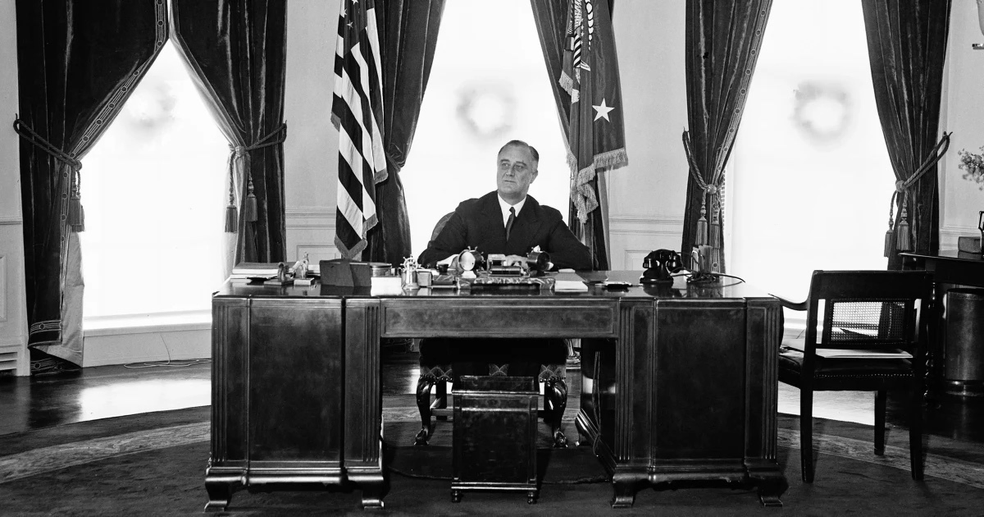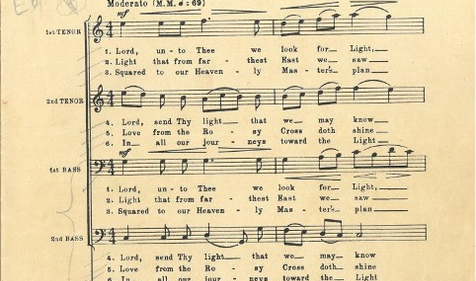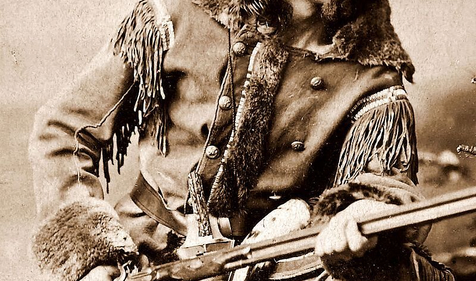"If civilization is to survive, we must cultivate the science of human relationships - the ability of all peoples, of all kinds, to live together, in the same world at peace." – President Franklin Delano Roosevelt
When Franklin Delano Roosevelt was elected president of the United States of America in 1932, the country faced unprecedented economic, diplomatic, and social challenges. That he was elected four times – the longest tenure of any president before or after – at this most turbulent time in American history speaks to his unparalleled leadership skills, unwavering compassion for all humanity, and keen political mind.
Youth and Education
Franklin Delano Roosevelt (FDR) was born on January 30, 1882, in Hyde Park, New York to parents James Roosevelt I, a businessman and politician, and his second wife, Sara Ann Delano. Franklin's parents were both raised in affluent families, and his half-brother James came from his father's first marriage.
James was a prominent Democrat and even took young Franklin to meet President Grover Cleveland. It is said that Cleveland said to him: "My little man, I am making a strange wish for you. It is that you may never be President of the United States."
As a young boy, FDR was primarily homeschooled by his parents who taught him to speak German and French. The family regularly traveled to Europe, and when Franklin was nine, he received some schooling in Germany. For high school, he attended the Groton School in Massachusetts. After graduating in 1900, he went to Harvard University for his bachelor's degree and then to New York's Columbia University, where he studied law. It was during his law school years that Roosevelt's father passed away, greatly impacting the young man.
After his fifth cousin, Theodore Roosevelt, became President of the United States Franklin immediately gravitated towards Teddy's style of leadership. On March 17, 1905, Roosevelt married his long-time friend and sweetheart, Eleanor, and the two would stay together for the remainder of his life.
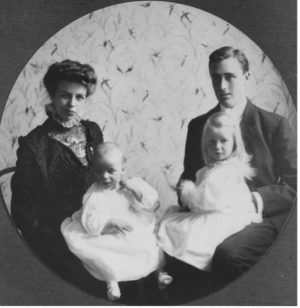 Franklin and Eleanor Roosevelt with children, Ana, and James
Franklin and Eleanor Roosevelt with children, Ana, and James
In 1907, Roosevelt passed the New York Bar Examination and began working for the prestigious Carter Ledyard & Milburn law firm. This was the beginning of what would become a long and storied career in the world of law and politics.
A Born Democrat
After several years working at the law firm, Roosevelt heeded the call of public service. Not yet 30 in 1910, Roosevelt ran as a Democrat for a seat in the New York Senate. Even though his district traditionally skewed Republican, he won the seat.
FDR’s political platform was informed by President Theodor Roosevelt's progressive politics and Eleanor's charitable endeavors supporting the poor in New York City. He ardently believed those most in need of relief should be helped and that the government should be willing to provide that aid.
FDR the Freemason
The beginning of Franklin Roosevelt's time in politics coincided with his initiation into Freemasonry. FDR was initiated as a Freemason on October 10, 1911, at Holland Lodge, No. 8 in New York City. Brother Roosevelt was raised a Master Mason a few months following his initiation. The camaraderie and philosophies of Freemasonry clearly spoke to Roosevelt, as he remained an active Mason for decades. In 1929, he petitioned to join the Ancient Accepted Scottish Rite in the Albany Consistory of New York, receiving the 32nd degree the same day. The following year he became a Shriner in Albany's Cyrus Temple.
The more involved Brother Roosevelt became in Freemasonry, the deeper into the Craft he sought to journey. His other notable Masonic accomplishments included:
- Serving with the Greenwood Forest, Tall Cedars of Lebanon in Warwick, New York
- Becoming a Prophet at Sight in Tri-Po-Bed Grotto, MOVPER (Mystic Order Veiled Prophets of the Enchanted Realm) of Poughkeepsie, New York
- Receiving honorary membership of several Masonic lodges, including Architect Lodge, No. 519, New York.
- Honorary Grand Master of Georgia
- Honorary Grand Master of the Order of DeMolay.
 FDR at the Masonic initiation for sons James and Franklin, Jr. at the Architect Lodge in Manhattan
FDR at the Masonic initiation for sons James and Franklin, Jr. at the Architect Lodge in Manhattan
Brother Roosevelt even had the honor of initiating his sons, Franklin, Jr., and James, into the fraternity at Architect Lodge, No. 519, on November 7, 1935. After the ceremony, he said, "To me, the ceremonies of Freemasonry in this state of ours, especially these later ones that I have taken part in, always make me wish that more Americans, in every part of our land, could become connected with our fraternity."
On the National Stage
In 1923, Roosevelt endorsed Woodrow Wilson in his bid for the Democratic presidential nomination. In exchange for his support, Wilson named Roosevelt the assistant secretary of the United States Navy. In 1921, Franklin contracted poliomyelitis which nearly paralyzed him and threatened to derail his entire career. His body was permanently weakened by the illness, and his mother thought it was time for him to retire from public life. Franklin and Eleanor, however, rightly believed he should continue to serve. Roosevelt recovered and won the race for Governor of New York in 1928.
During his first term, Governor Roosevelt was dedicated to helping the average working man in New York. He instituted tax relief programs for farmers and lowered the cost of public utilities, policies that were so popular he easily won a second term in 1930. Not only were his policies effective, but they were so widely embraced that Roosevelt was emboldened in his left-wing position. The Great Depression devastated the nation, and Roosevelt boldly used the state government to support its citizens. In 1931, he worked with the state congress to create the Temporary Emergency Relief Administration, which provided unemployment assistance to state residents.
The Next President Roosevelt
During the early 1930s, no politician in the country was more widely respected by the average voter than FDR. New Yorkers loved his aggressive approach to tackling economic issues, and, by 1932, he was destined to receive the Democratic presidential nomination. While not everyone in his party was comfortable with how left-leaning his politics were, he was unwavering in his convictions.
When it came time to face President Herbert Hoover in the general election, the specter of the Great Depression loomed large. Roosevelt won the presidency with ease, virtually eliminating the Republican party from national politics.
 President Franklin Delano Roosevelt
President Franklin Delano Roosevelt
When FDR became president, more than 13 million people were unemployed, and industries, from finance to farming, were suffering dramatically. The new president took his ambitious economic policies and set to work on developing social and economic programs meant to put people back to work and relieve sectors of the economy devastated by the Great Depression.
He gave more power to labor unions, established Social Security, increased taxes on the wealthiest Americans, instituted massive work relief programs, and much more. Corporations may not have loved these policies, but the people did. President Roosevelt won his second term easily in 1936 amidst the growing threat of war in Europe and Asia.
World War II
Despite his best efforts to maintain neutrality at the onset of World War II, Roosevelt recognized the need to provide aid to its closest ally: Great Britain. Ultimately, following the attack by Japan on Pearl Harbor on December 7, 1941, FDR was left with little choice but to join the largest war in human history.
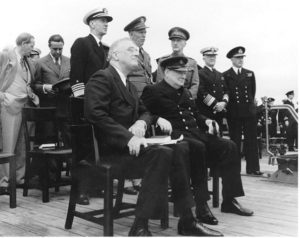 Two famous Freemasons: President Franklin D. Roosevelt and Winston Churchill
Two famous Freemasons: President Franklin D. Roosevelt and Winston Churchill
He mobilized the United States military and devoted the country's industrial infrastructure to creating resources for the war effort. He famously met with fellow Freemason Prime Minister Winston Churchill to form the Atlantic Charter, which proposed the "Four Freedoms" that should be guaranteed in the post-war world: freedom of speech and expression, freedom of religion, freedom from want, and freedom from fear.
Roosevelt was unwavering in his commitment to diplomacy even as global tensions reached a fever pitch. He took the precarious but necessary step of establishing a positive relationship between the United States and Russia. Making an ally of the world's largest nation was essential in defeating the Nazis in World War II.
Now in a brutal war fresh on the heels of a devastating economic crisis, Roosevelt understood the toll it was taking on regular Americans. He regularly broadcast “fireside chats” over the radio throughout the war to bolster American support for the war effort.
The Final Term
When Franklin D. Roosevelt was reelected to his fourth term in 1944, the Allies were winning the war, and the end was in sight. Sadly, his health suffered tremendously under the weight of 12 years as president. He suffered a brain hemorrhage and died on April 12, 1945, in Warm Springs, Georgia, at the age of 63.
 Americans line the streets in Washington, D.C. for Brother Roosevelt’s funeral procession
Americans line the streets in Washington, D.C. for Brother Roosevelt’s funeral procession
More than 300,000 Americans lined the streets of Washington, D.C. during his funeral procession to bid farewell to their president. Roosevelt's reputation for diplomacy and decency was known throughout the world, and he was mourned by allies across the globe. To this day, there have been few people as successful in their endeavors to cement just and equitable policies into the fabric of American life.
It could be argued that no president before or after has entered the White House at a more precarious and dangerous time in world history The nation was economically shattered, and its spirit was battered. But President and Brother Franklin Roosevelt leaned on the lessons he learned in Lodge. He was fervent in his pursuit of peace and prosperity for all Americans, and in providing relief when needed. Through his unwavering commitment to his principles and ideals, Roosevelt secured his place in the pantheon of the greatest of men and the greatest of leaders.
Brother and President Franklin Delano Roosevelt is a 2023 inductee to the Scottish Rite Masonic Museum & Library’s Masonic Hall of Fame.
Related Stories
Discover additional Scottish Rite blogs and news on this topic.
